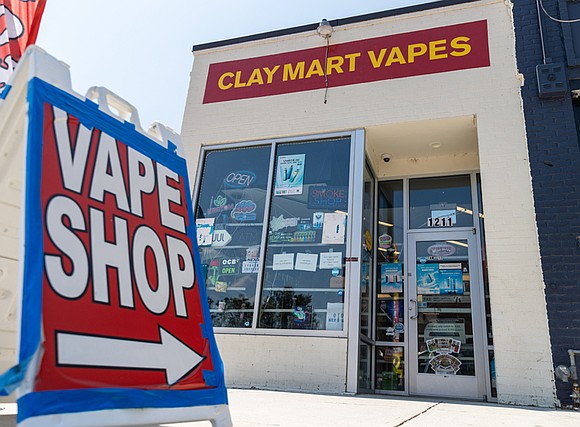City ramps up pressure on problem vape shops
“If you can’t push them out through policy, tax them out.” — Stephanie Lynch, City Council member 5th District
10/30/2025, 6 p.m.

City officials are weighing tougher measures on vape shops, including higher taxes, nuisance penalties and stricter enforcement, after repeated problems with illegal activity and robberies tied to some of the stores. Council members expressed frustration over the challenges of regulating the businesses during a Public Safety Committee meeting Tuesday, and explored new ways to address illegal sales and other ongoing problems.
 Stephanie Lynch
Stephanie Lynch
“If you can’t push them out through policy, tax them out,” 5th District Council member Stephanie Lynch said, suggesting they focus on liquid vape taxes. “Let’s tax them a thousand, 5,000%.”
State law limits the city’s ability to raise liquid and vapor nicotine taxes, but local codes may offer other options. Police Chief Rick Edwards and Planning Director Kevin Vonck said they are exploring actions allowed under existing laws on drug blight and nuisances, including illegal firearm discharges.
Vonck also floated the possibility of the Virginia Alcoholic Beverage Control Authority ensuring compliance from stores that also sell alcohol.
Vape shops around Richmond have faced increased scrutiny, including a new ordinance limiting where stores can open in the city and area police raids that resulted in eight arrests and the seizure of 60 pounds of marijuana.
Problems have persisted. Commercial robberies in Richmond are up 15% this year, the Richmond Police Department said, with vape shops accounting for 34% of those incidents. Firearms were used in 88% of the vape shop robberies.
At least 87 vape shops continue to operate in the city, according to police audit data. Edwards said “almost the majority” are involved in marijuana and THC sales illegal under state law.
More shops may be operating, as some unexpected locations have been found selling marijuana, often without any obvious advertisement.
“We executed a search warrant recently on a shop that looked like a home from the outside,” Edwards said. “They actually had a business license, but there was no signage, no nothing.”
Edwards and Vonck also described the challenges of shutting down shops that reopen quickly after seizures or arrests, and of regulating stores that continue operating despite past and ongoing violations.
“When we do coordinated enforcement, we often do find building code violations, health code violations, that they don’t have a business license, maybe there’s delinquent taxes,” Vonck said. “Those elements are not, in and of itself, enough to stop the use.”
Enforcing the ordinance also remains a challenge. It bars new stores from opening within 1,000 feet of schools and parks but does not apply to shops that existed before it took effect. Vonck said the exception also applies when ownership of an existing shop changes hands.
With Election Day less than a week away and the city’s legislative agenda in development, officials are also considering how the state might address the issue in 2026.
“If there’s any state laws that you think would strengthen your ability to curtail or regulate these stores, ideas are welcome,” Lynch told Edwards and Vonck.







